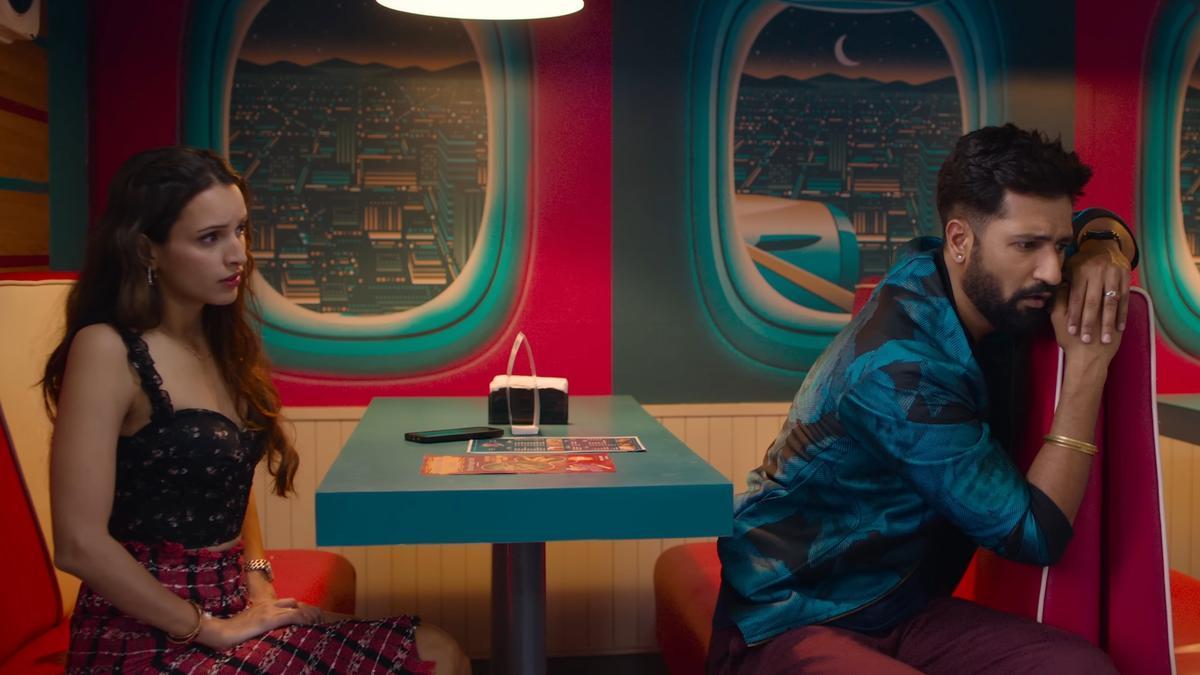
After the hard-hitting, high-octane thriller “Kill,” the Dharma family returns to their bread-and-butter formula in “Bad Newz,” a new film that tries hard to replicate the success of its spiritual predecessor “Good Newwz” but falls short. Producer Karan Johar, who has a reputation for pushing boundaries, seems to have pulled back just before the boiling point in this latest venture. Directed by Anand Tiwari, “Bad Newz” promises more than it delivers, coming across as a simplistic repackaging of popular Punjabi cinema for a Hindi-speaking audience. With its over-the-top background score and predictable plot, the film appears to be a melodramatic take on a rare biological phenomenon called heteropaternal superfecundation.
In layman’s terms, heteropaternal superfecundation is a rare condition where a woman releases two eggs in one menstrual cycle, which get fertilized by sperm from different partners. In Bollywood terms, this serves as a metaphor for love triangles and the complications that arise from them. Tiwari has crafted this film with an eye towards the liberal but can’t afford to alienate the conservative family audience that is the staple of Bollywood films.
The story revolves around Saloni Bagga (Triptii Dimri), a young chef who dreams of winning a Meraki Star, a prestigious culinary award. Her journey takes a detour when she falls in love with Akhil Chaddha (Vicky Kaushal), a charismatic but irresponsible West Delhi boy who runs a popular soya chaap shop. Despite his charms, Akhil is a mamma’s boy, and his overprotectiveness hinders Saloni’s professional growth. As their relationship hits a rough patch, Saloni takes up a job at a hotel in Mussoorie, where she meets Gurbir (Ammy Virk), a composed Punjabi chef nursing a broken heart.
In an unusual twist for a Hindi movie heroine, Saloni succumbs to her emotions, only to discover that jumping into a new relationship without resolving the baggage from her previous one was not the wisest decision. This underlying theme is a metaphor for the modern working woman’s struggle to balance personal and professional life. The fraternal twins developing in Saloni’s womb symbolize her career and romantic life. The question is whether they can coexist or if one has to sacrifice for the other’s survival.
However, the film’s screenplay lacks the depth or subtlety to explore these themes effectively. Instead, it reduces Saloni’s relatable dilemma to a comedic trope. The movie’s focus moves away from Saloni’s career ambitions in favor of a predictable, comedic rivalry between the potential fathers of her twins.
.
Writers Ishita Moitra and Tarun Dudeja seem intent on keeping the narrative light-hearted, stitching together a series of comic sketches to maintain audience interest. Some of these set pieces hit the mark, like the glimpses into how elderly people engage with daily soaps and reality TV. However, the film’s humor often feels disjointed and superficial, as if it’s borrowed piecemeal from other sources without adequate contextualization or emotional weight.
Adding to the film’s inconsistencies is its attempt to sound marketable. The item number “Tauba Tauba” feels tacked on, as if the makers wanted the audience to tune into a catchy song immediately after being introduced to the complex concept of heteropaternal superfecundation and the significance of winning a Meraki Star. This film, which aims to highlight the intricacies of the food business, ultimately feels like a poorly executed ad for the rating system evaluating businesses.
The setting also leaves much to be desired. Despite featuring characters entrenched in the food business, the atmosphere doesn’t live up to the ambition. It fails to authentically capture either the essence of Karol Bagh or the upscale vibe of South Delhi, making the film feel rootless.
Triptii Dimri, after being hailed as a national crush by social media, is navigating the glitzy but often superficial landscape of early Bollywood fame. While she needs to refine her comic timing, her emotional depth remains noteworthy. Every time the film requires a serious emotional response, she shines, reminding viewers of the potential she demonstrated in “Bulbbul.”
Ammy Virk pleasantly surprises as Gurbir, a character not reduced to the typical Sikh stereotypes in Hindi comedies. Unfortunately, his character lacks depth, leaving him with little more than a fascination for non-vegetarian food as a defining trait. The screenplay doesn’t give him the material to fully flesh out his character.
Vicky Kaushal, on the other hand, stands out as the film’s saving grace. His portrayal of Akhil Chaddha keeps the film afloat even when the script flounders. Kaushal’s Akhil is reminiscent of Ranveer Singh’s Rocky from Johar’s cinematic universe, and his lively dance moves, if only they could translate into the storyline’s fluidity, could have elevated “Bad Newz” from being merely passable to genuinely entertaining.












